Boyle J.A. The Cambridge History of Iran, Volume 5: The Saljuq and Mongol Periods
Подождите немного. Документ загружается.

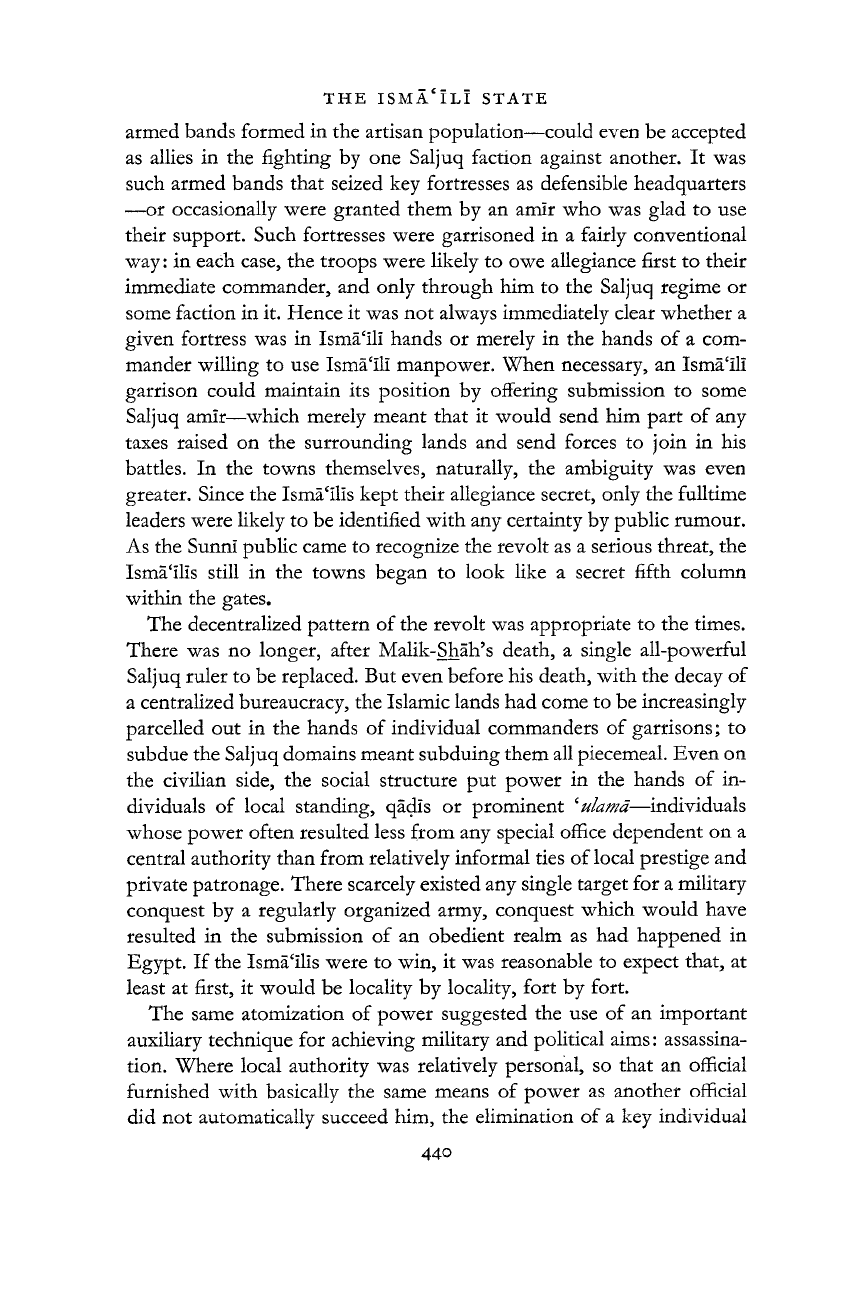
THE
ISMA'ILI
STATE
44o
armed bands formed in the artisan population—could even be accepted
as allies in the fighting by one Saljuq faction against
another.
It was
such armed bands
that
seized key fortresses as defensible headquarters
—or occasionally were granted them by an amir who was glad to use
their support. Such fortresses were garrisoned in a fairly conventional
way:
in each case, the troops were likely to owe allegiance first to their
immediate commander, and only through him to the Saljuq regime or
some faction in it. Hence it was not always immediately clear whether a
given
fortress was in Isma'ill
hands
or merely in the
hands
of a com-
mander willing to use Isma'ili manpower. When necessary, an Isma'ili
garrison could maintain its position by offering submission to some
Saljuq
amir—which merely meant
that
it would send him
part
of any
taxes raised on the surrounding lands and send forces to join in his
battles. In the towns themselves, naturally, the ambiguity was even
greater. Since the Isma'llis kept their allegiance secret, only the fulltime
leaders were likely to be identified with any certainty by public
rumour.
As
the Sunni public came to recognize the revolt as a serious
threat,
the
Isma'ilis still in the towns began to look like a secret fifth column
within the gates.
The
decentralized
pattern
of the revolt was appropriate to the times.
There was no longer, after Malik-Shah's death, a single all-powerful
Saljuq
ruler to be replaced. But even before his death, with the decay of
a centralized bureaucracy, the Islamic lands had come to be increasingly
parcelled out in the
hands
of individual commanders of garrisons; to
subdue the Saljuq domains meant subduing them all piecemeal. Even on
the civilian side, the social
structure
put power in the
hands
of in-
dividuals of local standing, qadls or prominent 'ulamd—individuals
whose
power often resulted less from any special
office
dependent on a
central authority
than
from relatively informal ties of
local
prestige and
private patronage. There scarcely existed any single target for a military
conquest by a regularly organized army, conquest which would have
resulted in the submission of an obedient realm as had happened in
Egypt.
If the Isma'ilis were to win, it was reasonable to expect
that,
at
least at first, it would be locality by locality, fort by fort.
The
same atomization of power suggested the use of an important
auxiliary
technique for achieving military and political aims: assassina-
tion. Where local authority was relatively personal, so
that
an
official
furnished with basically the same means of power as another
official
did not automatically succeed him, the elimination of a key individual
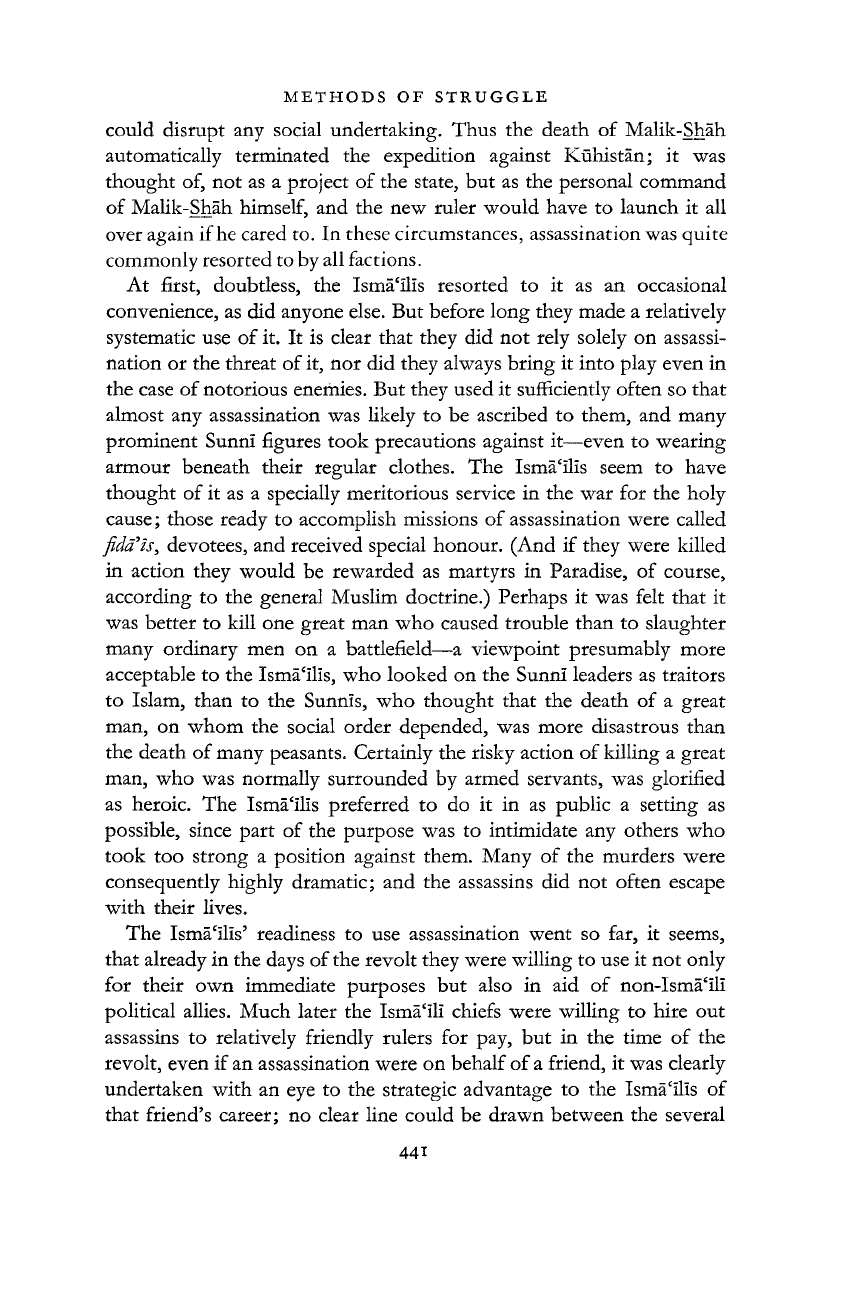
METHODS
OF
STRUGGLE
441
could
disrupt any social undertaking. Thus the death of Malik-Shah
automatically terminated the expedition against Kuhistan; it was
thought of, not as a project of the state, but as the personal command
of
Malik-Shah himself, and the new ruler would have to launch it all
over
again
if
he cared to. In these circumstances, assassination was quite
commonly
resorted to by all factions.
At
first, doubtless, the Isma'ilis resorted to it as an occasional
convenience,
as did anyone else. But before long they made a relatively
systematic use of it. It is clear
that
they did not rely solely on assassi-
nation or the
threat
of it, nor did they always bring it into play even in
the case of notorious enemies. But they used it sufficiently often so
that
almost any assassination was likely to be ascribed to them, and many
prominent Sunni figures took precautions against it—even to wearing
armour beneath their regular clothes. The Isma'ilis seem to have
thought of it as a specially meritorious service in the war for the holy
cause;
those ready to accomplish missions of assassination were called
fidats,
devotees,
and received special honour. (And if they were killed
in action they would be rewarded as martyrs in Paradise, of course,
according
to the general Muslim doctrine.) Perhaps it was felt
that
it
was
better to
kill
one great man who caused trouble
than
to slaughter
many ordinary men on a battlefield—a viewpoint presumably more
acceptable
to the Isma'ilis, who looked on the Sunni leaders as
traitors
to Islam,
than
to the Sunnis, who thought
that
the death of a great
man, on whom the social order depended, was more disastrous
than
the death of many peasants. Certainly the risky action of killing a great
man, who was normally surrounded by armed servants, was glorified
as heroic. The Isma'ilis preferred to do it in as public a setting as
possible,
since
part
of the purpose was to intimidate any others who
took
too strong a position against them. Many of the
murders
were
consequently highly dramatic; and the assassins did not often escape
with
their
lives.
The
Isma'ilis' readiness to use assassination went so far, it seems,
that
already in the days of the revolt they were willing to use it not only
for
their own immediate purposes but also in aid of non-Isma'ili
political
allies. Much later the Isma'ili chiefs were willing to hire out
assassins to relatively friendly rulers for pay, but in the time of the
revolt,
even if an assassination were on behalf of a friend, it was clearly
undertaken with an eye to the strategic advantage to the Isma'ilis of
that
friend's career; no clear line could be drawn between the several
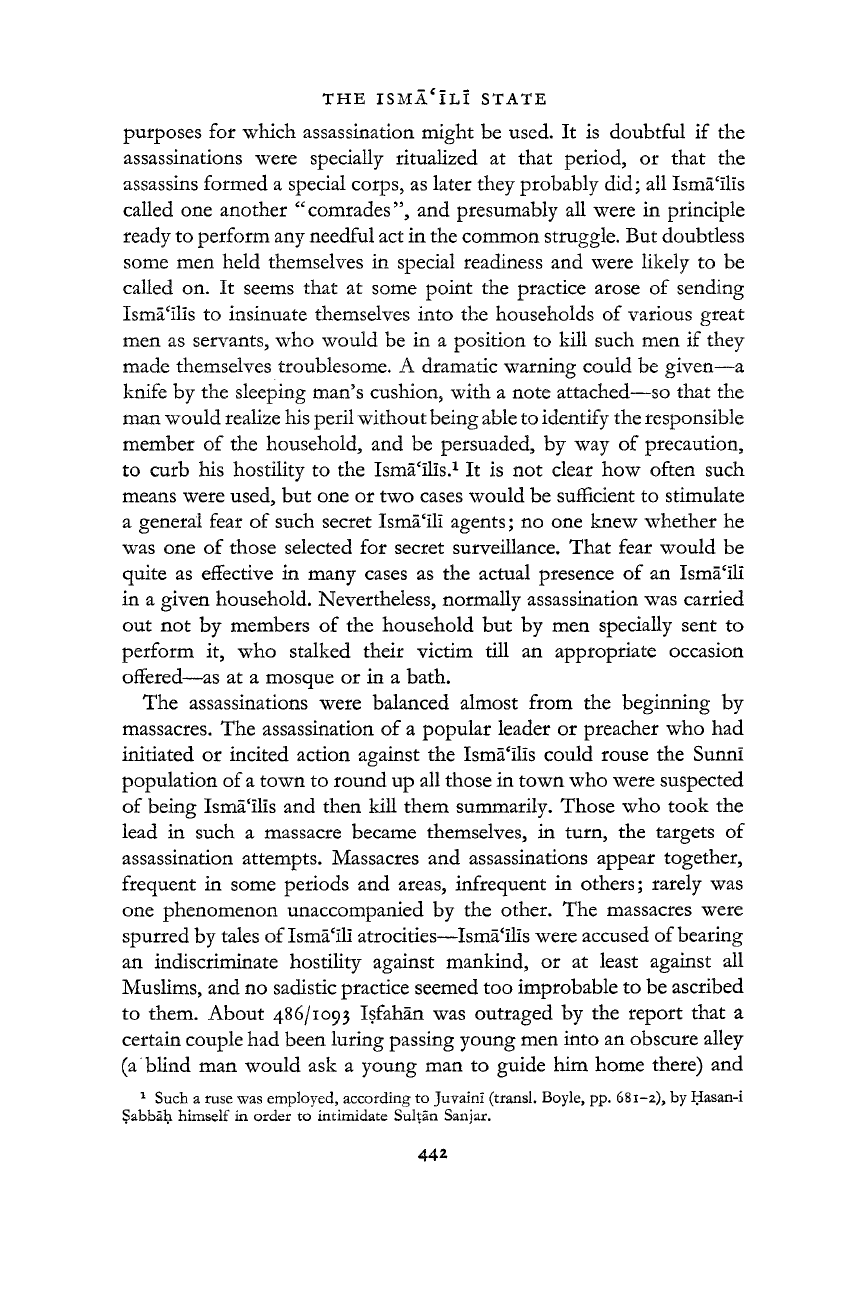
THE
ISMAIL!
STATE
442
purposes for which assassination might be used. It is doubtful if the
assassinations were specially ritualized at
that
period, or
that
the
assassins formed a special corps, as later they probably did; all Isma'llls
called
one
another
"comrades", and presumably all were in principle
ready to perform any needful act in the common struggle. But doubtless
some men held themselves in special readiness and were
likely
to be
called
on. It seems
that
at some point the practice arose of sending
Isma'llis to insinuate themselves into the households of various great
men as servants, who would be in a position to
kill
such men if they
made themselves troublesome. A dramatic warning could be given—a
knife
by the sleeping man's cushion, with a note attached—so
that
the
man would realize his peril without being able to identify the responsible
member of the household, and be persuaded, by way of precaution,
to curb his hostility to the Isma'llls.
1
It is not clear how often such
means were used, but one or two cases would be sufficient to stimulate
a general fear of such secret Isma'IlI agents; no one knew whether he
was
one of those selected for secret surveillance. That fear would be
quite as
effective
in many cases as the actual presence of an Isma'IlI
in a
given
household. Nevertheless, normally assassination was carried
out not by members of the household but by men specially sent to
perform it, who stalked their victim till an appropriate occasion
offered—as
at a mosque or in a bath.
The
assassinations were balanced almost from the beginning by
massacres. The assassination of a popular leader or preacher who had
initiated or incited action against the Isma'lHs could rouse the Sunni
population of a town to round up all those in town who were suspected
of
being Isma'llls and
then
kill
them summarily. Those who took the
lead
in such a massacre became themselves, in
turn,
the targets of
assassination attempts. Massacres and assassinations appear together,
frequent in some periods and areas, infrequent in others; rarely was
one phenomenon unaccompanied by the other. The massacres were
spurred
by tales of Isma'Ili atrocities—Isma'llis were accused of bearing
an indiscriminate hostility against mankind, or at least against all
Muslims,
and no sadistic practice seemed too improbable to be ascribed
to them. About 486/1093 Isfahan was outraged by the
report
that
a
certain couple had been luring passing young men into an obscure alley
(a blind man would ask a young man to guide him home there) and
1
Such a
ruse
was employed, according to Juvaini (transl.
Boyle,
pp.
681-2),
by Hasan-i
Sabbah himself in order to intimidate Sultan
San
jar.
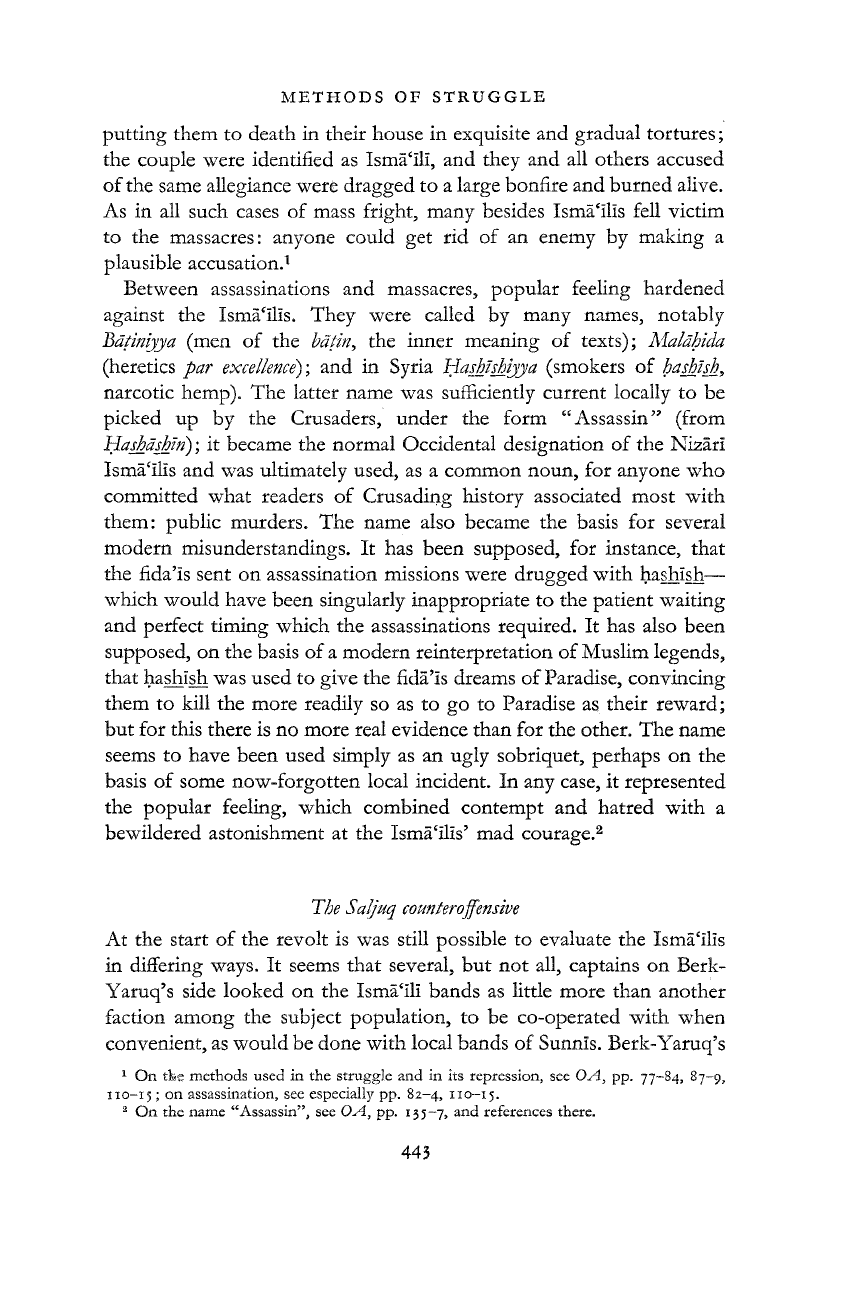
METHODS
OF
STRUGGLE
putting them to death in their house in exquisite and gradual tortures;
the couple were identified as Isma'ili, and they and all others accused
of
the same allegiance were dragged to a large bonfire and burned alive.
As
in all such cases of mass fright, many besides Isma'ilis
fell
victim
to the massacres: anyone could get rid of an enemy by making a
plausible accusation.
1
Between
assassinations and massacres, popular feeling hardened
against the Isma'ilis. They were called by many names, notably
Bdtiniyya (men of the bdtin, the inner meaning of texts); Alaldhida
(heretics par
excellence);
and in Syria Hashlshiyja (smokers of hashish,
narcotic hemp). The latter name was sufficiently current locally to be
picked
up by the Crusaders, under the form "Assassin" (from
Hashdshln); it became the normal Occidental designation of the Nizari
Isma'ilis and was ultimately used, as a common noun, for anyone who
committed what readers of Crusading history associated most with
them: public murders. The name also became the basis for several
modern misunderstandings. It has been supposed, for instance,
that
the fida'is sent on assassination missions were drugged with hashish—
which
would have been singularly inappropriate to the patient waiting
and perfect timing which the assassinations required. It has also been
supposed, on the basis of a modern reinterpretation of Muslim legends,
that
hashish was used to
give
the fida'is dreams of Paradise, convincing
them to
kill
the more readily so as to go to Paradise as their reward;
but for this there is no more real evidence
than
for the other. The name
seems to have been used simply as an ugly sobriquet, perhaps on the
basis of some now-forgotten local incident. In any case, it represented
the popular feeling, which combined contempt and hatred with a
bewildered
astonishment at the Isma'ilis' mad courage.
2
The
Saljuq counter offensive
At
the
start
of the revolt is was still possible to evaluate the Isma'ilis
in differing
ways.
It seems
that
several, but not all, captains on Berk-
Yaruq's
side looked on the Isma'ili bands as little more
than
another
faction
among the subject population, to be co-operated with when
convenient, as would be done with local bands of Sunnis. Berk-Yaruq's
1
On tke methods used in the struggle and in its repression, see OA, pp.
77-84,
87-9,
110-15; on assassination, see especially pp. 82-4, 110-15.
2
On the
name
"Assassin", see OA, pp.
135-7,
and references
there.
443
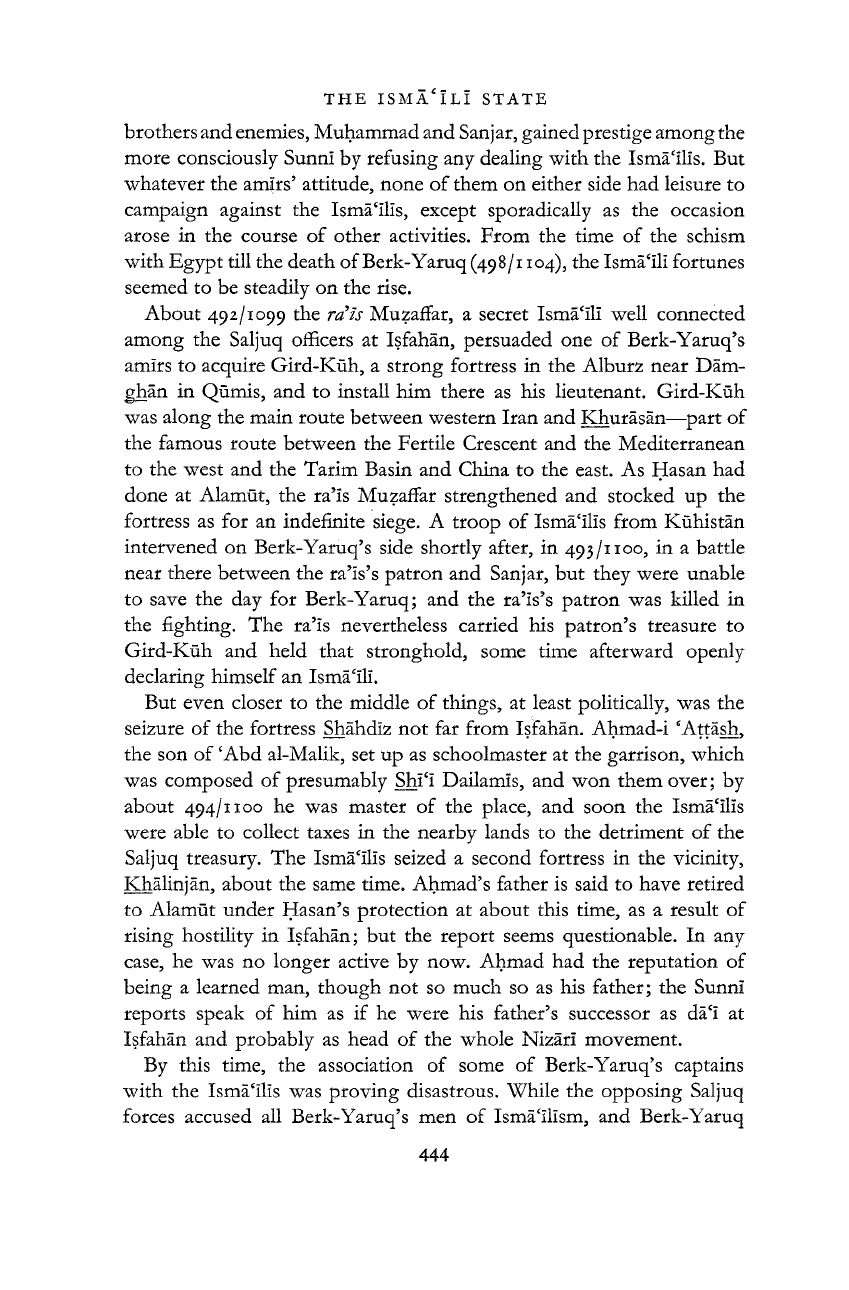
THE
ISMA'ILI
STATE
444
brothers and enemies, Muhammad and Sanjar, gained prestige among the
more consciously Sunni by refusing any dealing with the Isma'llls. But
whatever the am|rs' attitude, none of them on either side had leisure to
campaign against the Isma'llls, except sporadically as the occasion
arose in the course of other activities. From the time of the schism
with
Egypt till the death
of
Berk-
Yaruq
(49 8
/1104),
the Isma'IlI fortunes
seemed to be steadily on the rise.
About
492/1099 the
rats
MuzafFar, a secret Isma'IlI
well
connected
among the Saljuq officers at Isfahan, persuaded one of Berk-Yaruq's
amirs to acquire Gird-Kuh, a strong fortress in the Alburz near Dam-
ghan in Qumis, and to install him there as his lieutenant. Gird-Kuh
was
along the main route between western
Iran
and Khurasan—part of
the famous route between the Fertile Crescent and the Mediterranean
to the west and the Tarim Basin and China to the east. As Hasan had
done at Alamut, the
ra'Is
MuzafFar strengthened and stocked up the
fortress as for an indefinite siege. A troop of Isma'llls from Kuhistan
intervened on Berk-Yaruq's side shortly after, in 493/1100, in a battle
near there between the ra'Is's patron and Sanjar, but they were unable
to save the day for Berk-Yaruq; and the ra'Is's patron was killed in
the fighting. The
ra'Is
nevertheless carried his patron's treasure to
Gird-Kuh
and held
that
stronghold, some time afterward openly
declaring himself an Isma'Ili.
But
even closer to the middle of things, at least politically, was the
seizure of the fortress Shahdiz not far from Isfahan. Ahmad-i 'Attash,
the son of 'Abd al-Malik, set up as schoolmaster at the garrison, which
was
composed of presumably Shi'i Dailamis, and won them over; by
about 494/1100 he was master of the place, and soon the Isma'ilis
were
able to collect taxes in the nearby lands to the detriment of the
Saljuq
treasury. The Isma'llls seized a second fortress in the vicinity,
Khalinjan,
about the same time. Ahmad's father is said to have retired
to Alamut under Hasan's protection at about this time, as a result of
rising hostility in Isfahan; but the report seems questionable. In any
case,
he was no longer active by now. Ahmad had the reputation of
being a learned man, though not so much so as his father; the Sunni
reports speak of him as if he were his father's successor as da'l at
Isfahan and probably as head of the whole Nizarl movement.
By
this time, the association of some of Berk-Yaruq's captains
with
the Isma'ilis was proving disastrous. While the opposing Saljuq
forces
accused all Berk-Yaruq's men of Isma'ilism, and Berk-Yaruq
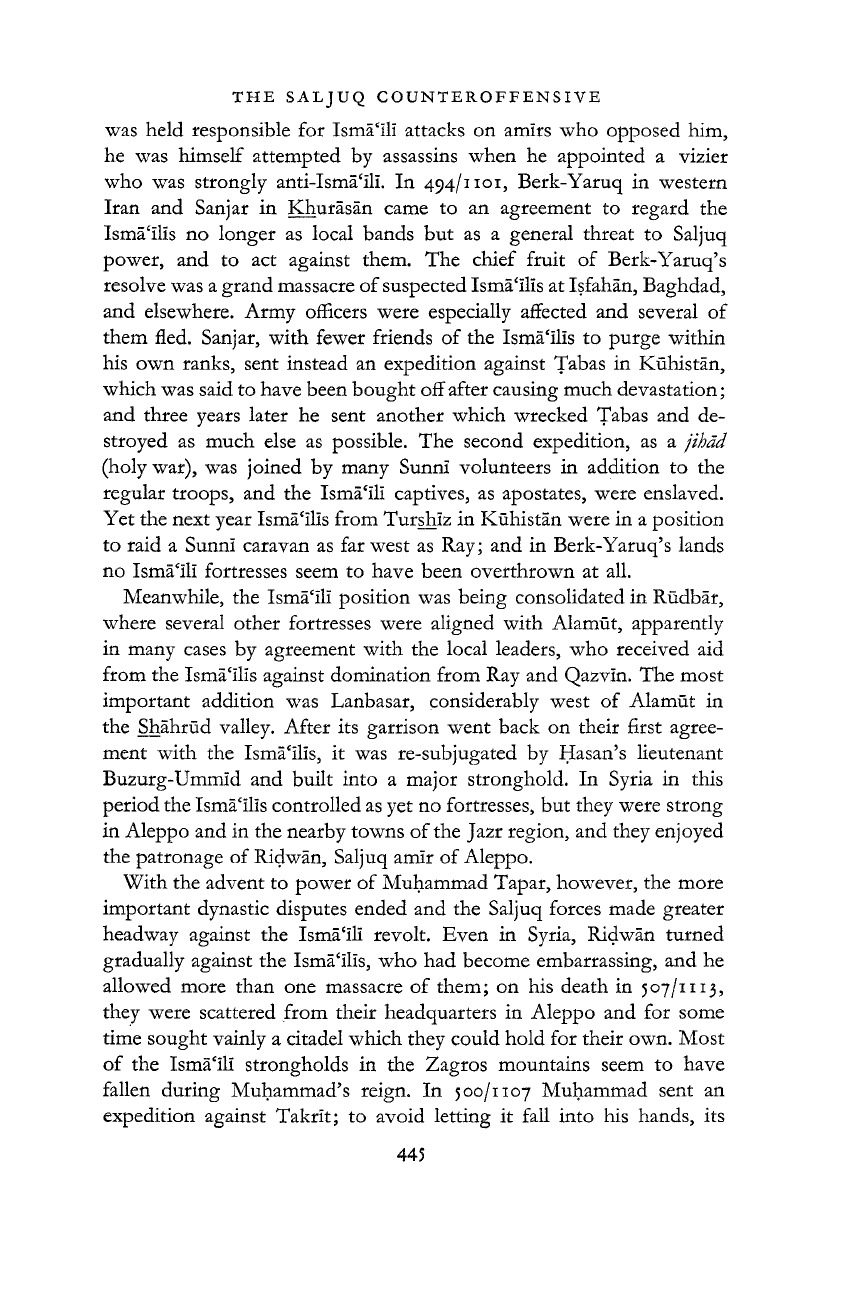
THE
SALJUQ COUNTEROFFENSIVE
was
held responsible for Isma'ili attacks on amirs who opposed him,
he was himself attempted by assassins when he appointed a vizier
who
was strongly anti-Isma'ili. In
494/1101,
Berk-Yaruq in western
Iran
and Sanjar in Khurasan came to an agreement to regard the
Isma'ilis no longer as local bands but as a general
threat
to Saljuq
power,
and to act against them. The
chief
fruit of Berk-Yaruq's
resolve
was a grand massacre of suspected Isma'ilis at Isfahan, Baghdad,
and elsewhere. Army officers were especially affected and several of
them fled. Sanjar, with fewer friends of the Isma'ilis to purge within
his own ranks, sent instead an expedition against Tabas in Kuhistan,
which
was said to have been bought
off
after causing much devastation;
and
three
years later he sent another which wrecked Tabas and de-
stroyed as much else as possible. The second expedition, as a jihad
(holy
war), was joined by many Sunni volunteers in addition to the
regular troops, and the Isma'ili captives, as apostates, were enslaved.
Yet
the next year Isma'ilis from Turshiz in Kuhistan were in a position
to raid a Sunni caravan as far west as Ray; and in Berk-Yaruq's lands
no Isma'ili fortresses seem to have been overthrown at all.
Meanwhile,
the Isma'ili position was being consolidated in Rudbar,
where several other fortresses were aligned with Alamut, apparently
in many cases by agreement with the local leaders, who received aid
from
the Isma'ilis against domination from Ray and Qazvin. The most
important addition was Lanbasar, considerably west of Alamut in
the
Shahrud
valley.
After its garrison went back on their first agree-
ment with the Isma'ilis, it was re-subjugated by Hasan's lieutenant
Buzurg-Ummid
and built into a major stronghold. In Syria in this
period the Isma'ilis controlled as yet no fortresses, but they were strong
in Aleppo and in the nearby towns of the
Jazr
region, and they enjoyed
the patronage of Ridwan, Saljuq amir of
Aleppo.
With
the advent to power of Muhammad Tapar, however, the more
important dynastic disputes ended and the Saljuq forces made greater
headway
against the Isma'ili revolt. Even in Syria, Ridwan
turned
gradually
against the Isma'ilis, who had become embarrassing, and he
allowed
more
than
one massacre of them; on his death in
507/1113,
they were scattered from their headquarters in Aleppo and for some
time sought vainly a citadel which they could hold for their own. Most
of
the Isma'ili strongholds in the Zagros mountains seem to have
fallen
during Muhammad's reign. In 500/1107 Muhammad sent an
expedition
against Takrit; to avoid letting it fail into his hands, its
445
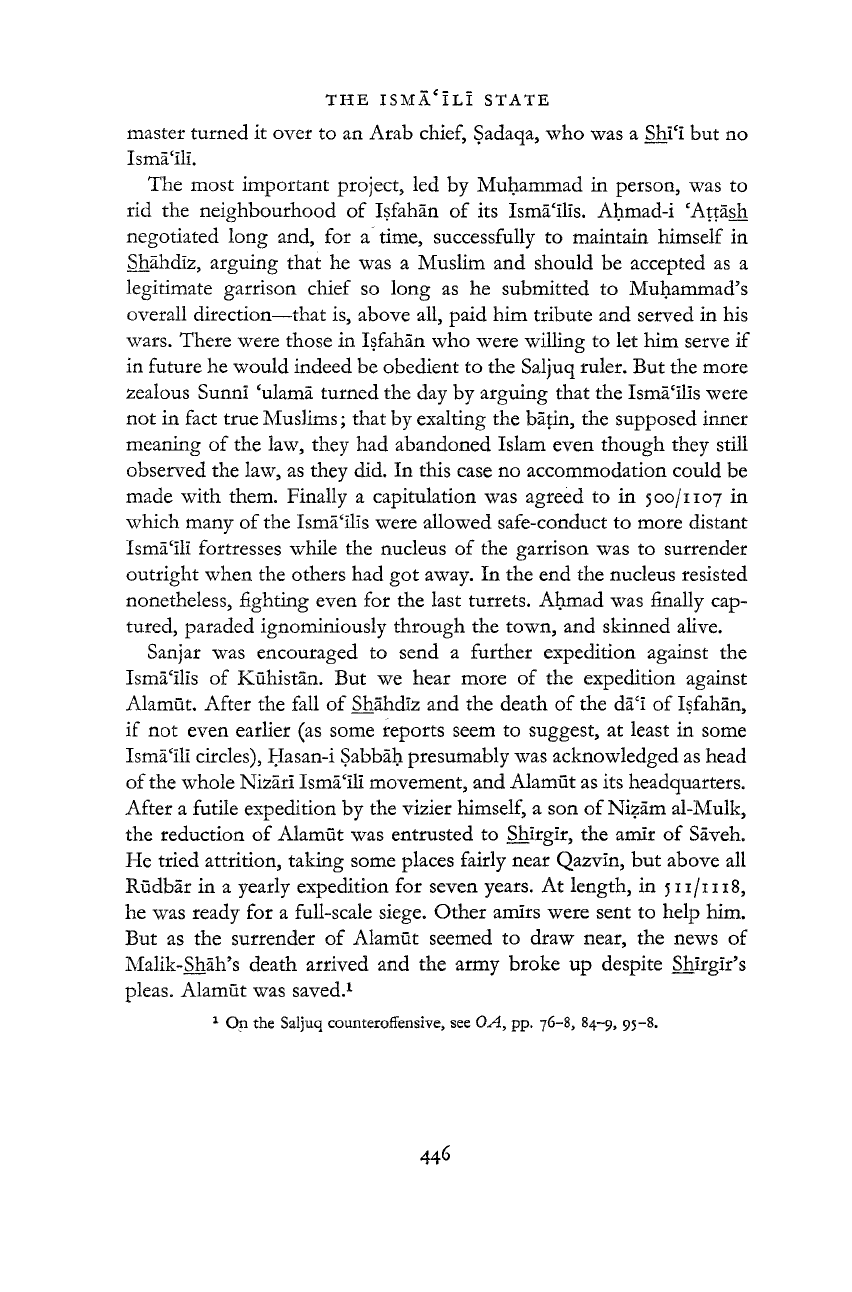
THE
ISMA'lLI
STATE
446
master
turned
it over to an Arab chief, Sadaqa, who was a ShI'I but no
Isma'ili.
The
most important project, led by Muhammad in person, was to
rid the neighbourhood of Isfahan of its Isma'llls. Ahmad-i 'Attash
negotiated long and, for a time, successfully to maintain himself in
Shahdiz,
arguing
that
he was a Muslim and should be accepted as a
legitimate garrison
chief
so long as he submitted to Muhammad's
overall
direction—that is, above all, paid him
tribute
and served in his
wars.
There were those in Isfahan who were willing to let him serve if
in future he would indeed be obedient to the Saljuq ruler. But the more
zealous
Sunni 'ulama
turned
the day by arguing
that
the Isma'llls were
not in fact
true
Muslims;
that
by exalting the batin, the supposed inner
meaning of the law
7
, they had abandoned Islam even though they still
observed
the law, as they did. In this case no accommodation could be
made with them. Finally a capitulation was agreed to in 500/1107 in
which
many of the Isma'llls were allowed safe-conduct to more distant
Isma'IlI fortresses while the nucleus of the garrison was to surrender
outright when the others had got away. In the end the nucleus resisted
nonetheless, fighting even for the last
turrets.
Ahmad was finally cap-
tured, paraded ignominiously through the town, and skinned alive.
San
jar was encouraged to send a further expedition against the
Isma'llls of Kuhistan. But we hear more of the expedition against
Alamut.
After the
fall
of Shahdiz and the death of the da'l of Isfahan,
if
not even earlier (as some reports seem to suggest, at least in some
Isma'IlI
circles),
Hasan-i Sabbah presumably was acknowledged as head
of
the whole Nizarl Isma'IlI movement, and Alamut as its headquarters.
After
a futile expedition by the vizier himself, a son of Nizam al-Mulk,
the reduction of Alamut was entrusted to Shirgir, the amir of Saveh.
He tried attrition, taking some places fairly near Qazvin, but above all
Rudbar in a yearly expedition for seven years. At length, in
511/1118,
he was ready for a full-scale siege. Other amirs were sent to help him.
But
as the surrender of Alamut seemed to draw near, the news of
Malik-Shah's
death arrived and the army broke up despite Shirgir's
pleas.
Alamut was saved.
1
1
On the Saljuq counteroffensive, see OA, pp. 76-8, 84-9, 95-8.
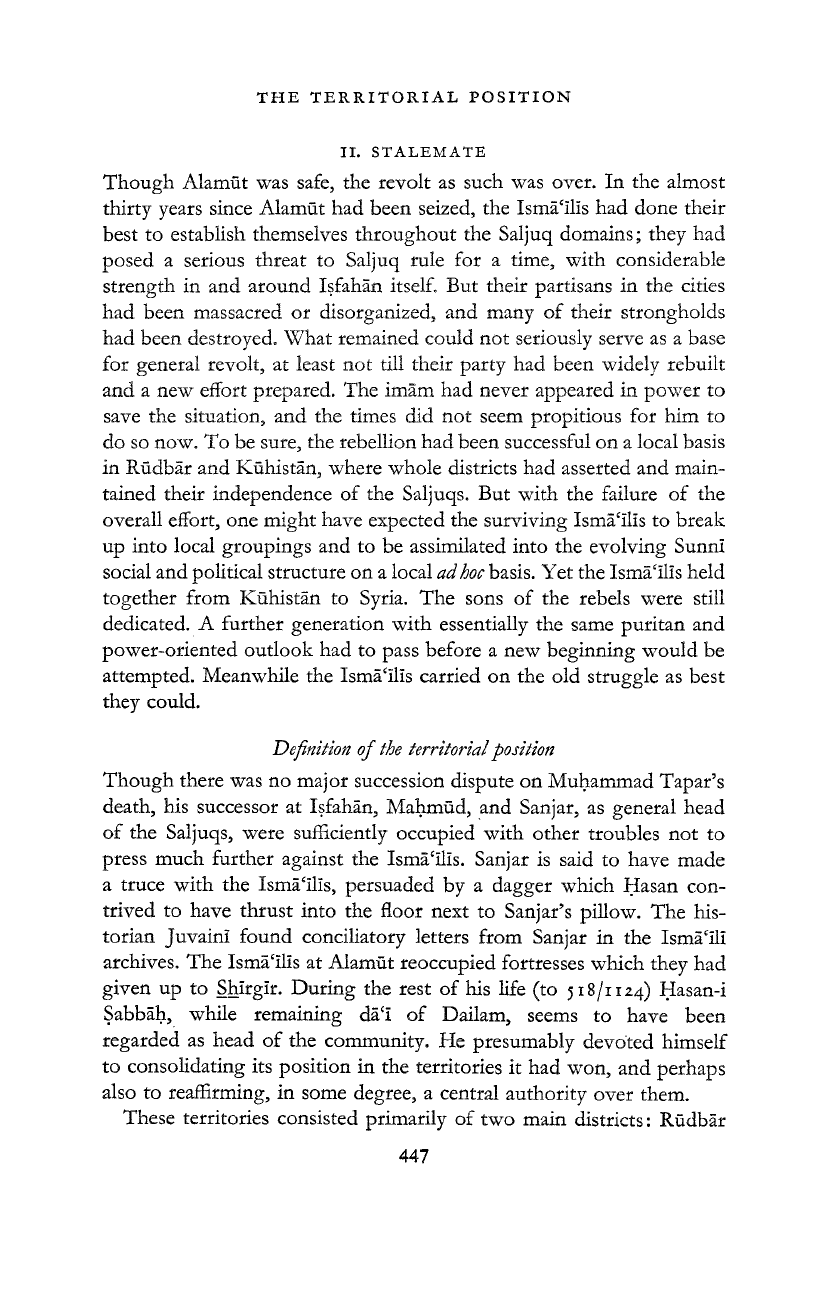
THE
TERRITORIAL POSITION
II.
STALEMATE
Though
Alamüt was safe, the revolt as such was over. In the almost
thirty years since
Alamüt had been seized, the Ismá'ilís had done their
best to establish themselves throughout the Saljuq domains; they had
posed a serious
threat
to Saljuq rule for a time, with considerable
strength in and around Isfahan itself. But their
partisans
in the cities
had been massacred or disorganized, and many of their strongholds
had been destroyed. What remained could not seriously serve as a base
for
general revolt, at least not till their party had been
widely
rebuilt
and a new effort prepared. The imam had never appeared in power to
save
the situation, and the times did not seem propitious for him to
do so now. To be sure, the rebellion had been successful on a local basis
in
Rüdbár and Kühistán, where whole districts had asserted and main-
tained their independence of the Saljuqs. But with the failure of the
overall
effort, one might have expected the surviving Isma'ilis to break
up into local groupings and to be assimilated into the
evolving
Sunni
social
and political
structure
on a local
ad
hoc
basis.
Yet the Ismá'ílis held
together from
Kühistán to Syria. The sons of the rebels were still
dedicated. A further generation with essentially the same
puritan
and
power-oriented outlook had to pass before a new beginning would be
attempted. Meanwhile the Isma'ilis carried on the old struggle as best
they could.
Definition of
the
territorial position
Though
there
was no major succession dispute on Muhammad Tapar's
death, his successor at Isfahan,
Mahmüd, and Sanjar, as general head
of
the Saljuqs, were sufficiently occupied with other troubles not to
press much further against the
Ismá'ilís. Sanjar is said to have made
a truce with the Isma'ilis, persuaded by a dagger which Hasan con-
trived to have
thrust
into the floor next to Sanjar's pillow. The his-
torian Juvaini found conciliatory letters from Sanjar in the Isma'ili
archives.
The Isma'ilis at Alamüt reoccupied fortresses which they had
given
up to Shirgir. During the rest of his
life
(to
518/1124)
Hasan-i
Sabbáh,
while remaining da'i of Dailam, seems to have been
regarded as head of the community. He presumably devoted himself
to consolidating its position in the territories it had won, and perhaps
also
to reaffirming, in some degree, a central authority over them.
These
territories consisted primarily of two main districts: Rüdbár
447
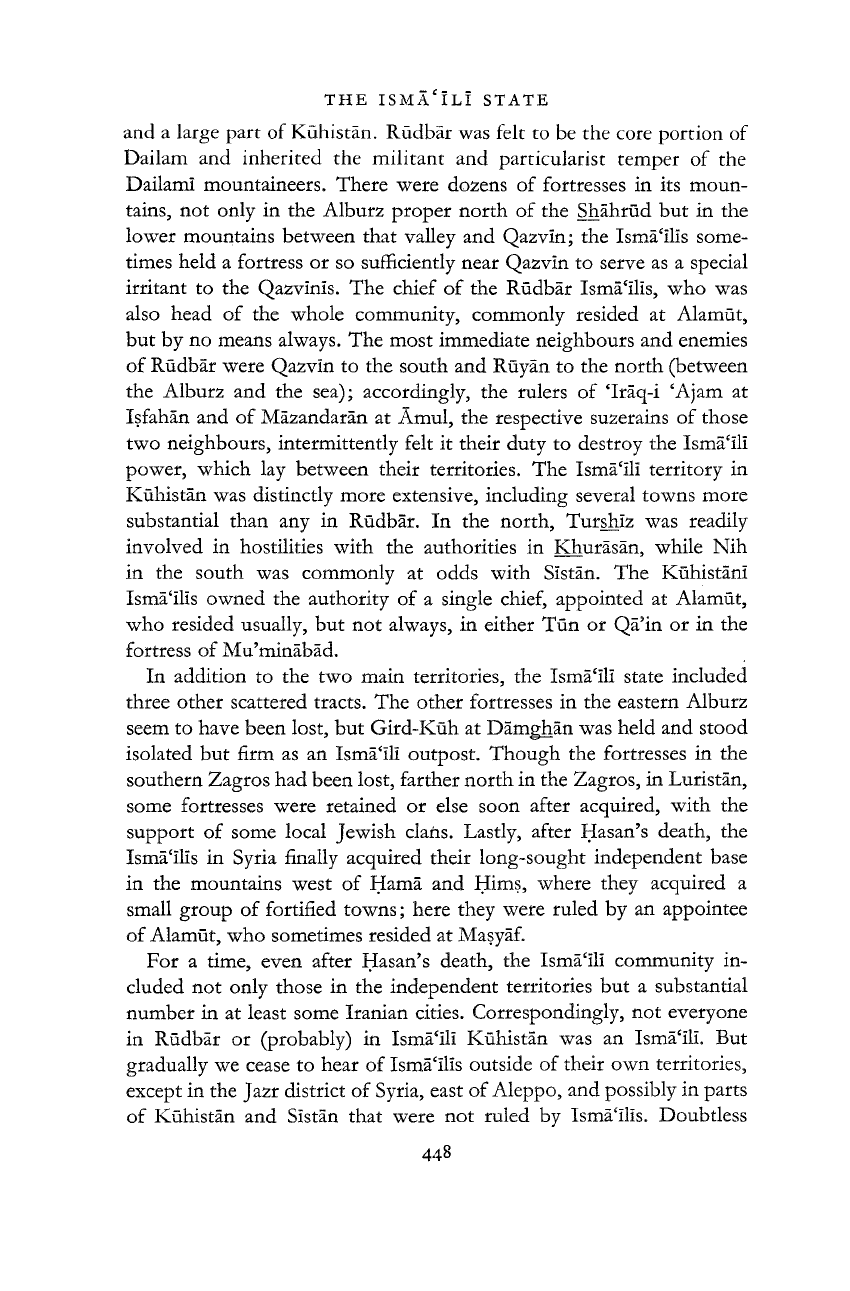
THE
ISMA'ILI
STATE
448
and a large
part
of Kuhistan. Rudbar was felt to be the core portion of
Dailam
and inherited the militant and particularist temper of the
Dailami
mountaineers. There were dozens of fortresses in its moun-
tains, not only in the Alburz proper
north
of the Shahrud but in the
lower
mountains between
that
valley and Qazvin; the Isma'ills some-
times held a fortress or so sufficiently near Qazvin to serve as a special
irritant
to the Qazvinis. The
chief
of the Rudbar Isma'Ilis, who was
also
head of the whole community, commonly resided at Alamut,
but by no means
always.
The most immediate neighbours and enemies
of
Rudbar were Qazvin to the south and Ruyan to the
north
(between
the Alburz and the sea); accordingly, the rulers of 'Iraq-i
'Ajam
at
Isfahan and of Mazandaran at
Amul,
the respective suzerains of those
two
neighbours, intermittently felt it their duty to destroy the Isma'IlI
power,
which lay between their territories. The Isma'IlI territory in
Kuhistan was distinctly more extensive, including several towns more
substantial
than
any in Rudbar. In the
north,
Turshiz was readily
involved
in hostilities with the authorities in Khurasan, while Nih
in the south was commonly at odds with Sistan. The KuhistanI
Isma'ilis owned the authority of a single chief, appointed at Alamut,
who
resided usually, but not
always,
in either Tun or Qa'in or in the
fortress of Mu'minabad.
In addition to the two main territories, the Isma'IlI
state
included
three
other scattered tracts. The other fortresses in the eastern Alburz
seem
to have been lost, but Gird-Kuh at Damghan was held and stood
isolated but firm as an Isma'ili outpost. Though the fortresses in the
southern Zagros had been lost, farther
north
in the Zagros, in Luristan,
some fortresses were retained or else soon after acquired, with the
support of some local Jewish clans. Lastly, after Hasan's death, the
Isma'Ilis in Syria finally acquired their long-sought independent base
in the mountains west of Hama and Hims, where they acquired a
small
group of fortified towns; here they were ruled by an appointee
of
Alamut,
who sometimes resided at Masyaf.
For a time, even after Hasan's death, the Isma'IlI community in-
cluded
not only those in the independent territories but a substantial
number in at least some Iranian cities. Correspondingly, not everyone
in Rudbar or (probably) in Isma'IlI Kuhistan was an Isma'ili. But
gradually
we cease to hear of Isma'Ilis outside of their own territories,
except
in the Jazr district of
Syria,
east of
Aleppo,
and possibly in
parts
of
Kuhistan and Sistan
that
were not ruled by Isma'ilis. Doubtless
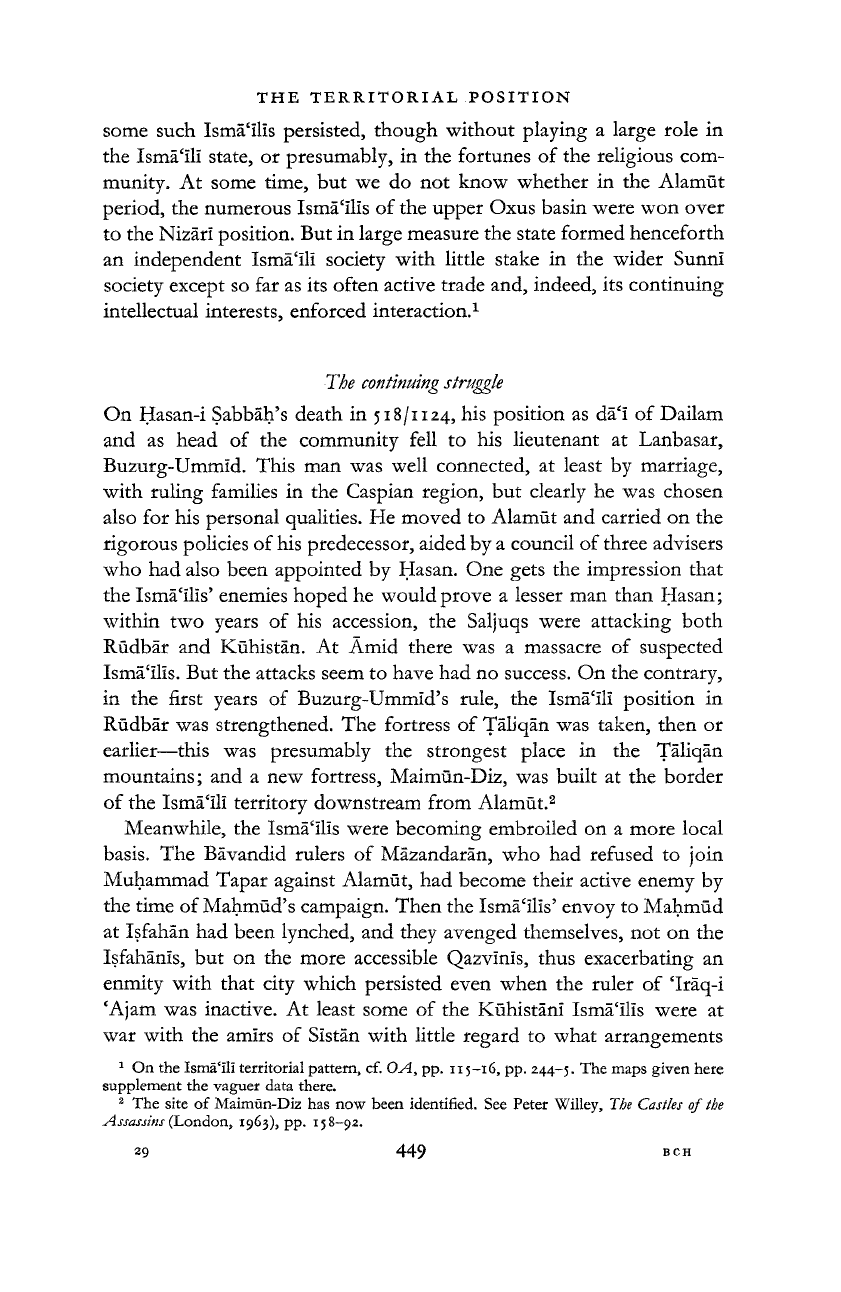
THE TERRITORIAL POSITION
some such Isma'ilis persisted, though without playing
a
large role
in
the Isma'ili state,
or
presumably,
in the
fortunes
of
the religious com-
munity.
At
some time,
but we do not
know whether
in the
Alamut
period,
the
numerous Isma'ilis of the upper Oxus basin were won over
to the Nizari position. But
in
large measure the
state
formed henceforth
an independent Isma'ili society with little stake
in the
wider Sunni
society
except so
far
as
its
often active
trade
and, indeed,
its
continuing
intellectual interests, enforced interaction.
1
The
continuing
struggle
On
Hasan-i Sabbah's death
in
518/1124,
his position
as da'i of
Dailam
and
as
head
of the
community
fell
to his
lieutenant
at
Lanbasar,
Buzurg-Ummid.
This
man was
well
connected,
at
least
by
marriage,
with
ruling families
in the
Caspian region,
but
clearly
he
was chosen
also
for
his personal qualities.
He
moved
to
Alamut
and
carried
on the
rigorous policies of his predecessor, aided by a council of
three
advisers
who
had also been appointed
by
Hasan. One gets
the
impression
that
the Isma'ilis' enemies hoped
he
would prove
a
lesser
man
than
Hasan;
within
two
years
of his
accession,
the
Saljuqs were attacking both
Rudbar
and
Kuhistan.
At
Amid
there
was a
massacre
of
suspected
Isma'ilis. But the attacks seem
to
have had no success. On the contrary,
in
the
first years
of
Buzurg-Ummid's rule,
the
Isma'ili position
in
Rudbar was strengthened.
The
fortress
of
Taliqan was taken,
then
or
earlier—this
was
presumably
the
strongest place
in the
Taliqan
mountains;
and a new
fortress, Maimun-Diz, was built
at the
border
of
the Isma'ili territory downstream from Alamut.
2
Meanwhile,
the
Isma'ilis were becoming embroiled
on a
more local
basis.
The
Bavandid rulers
of
Mazandaran,
who had
refused
to
join
Muhammad Tapar against Alamut,
had
become their active enemy
by
the time of Mahmud's campaign. Then the Isma'ilis' envoy
to
Mahmud
at Isfahan
had
been lynched,
and
they avenged themselves,
not on the
Isfahanis,
but on the
more accessible
Qazvinis,
thus
exacerbating
an
enmity with
that
city which persisted even when
the
ruler
of
'Iraq-i
'Ajam
was inactive.
At
least some
of the
Kuhistani Isma'ilis were
at
war
with
the
amirs
of
Sistan with little regard
to
what arrangements
1
On the
Isma'ili
territorial
pattern,
cf. OA, pp.
115-16,
pp. 244-5. The
maps
given
here
supplement
the
vaguer
data
there.
2
The
site
of
Maimun-Diz
has now
been identified.
See
Peter
Willey,
The Castles of the
Assassins
(London,
1963),
pp.
158-92.
29
449
BCH
